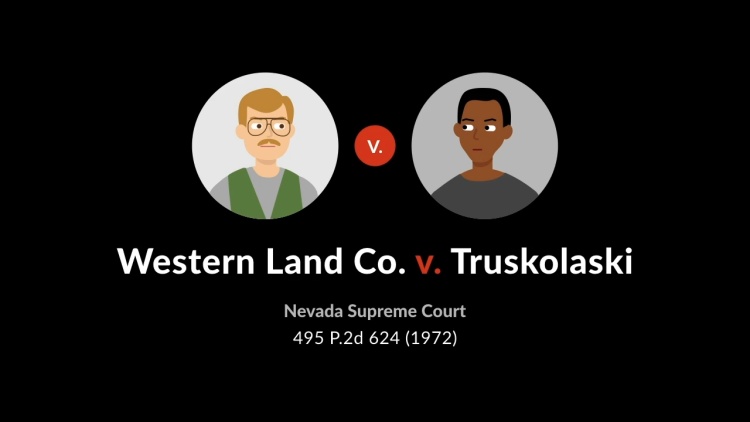Western Land Co. v. Truskolaski
Nevada Supreme Court
495 P.2d 624 (1972)
- Written by Dennis Chong, JD
Facts
In 1941, Western Land Co. (Western) (defendant) subdivided a 40-acre tract of land in Reno, Nevada, for residential use. Each lot in the Southland Heights subdivision was subject to a restrictive covenant forbidding use of the property for anything other than single-family homes. At the time, the surrounding area was used primarily for residential and agricultural purposes. Over the years, however, the area around the subdivision grew substantially. The roads bordering the subdivision had been expanded and were now main thoroughfares with a great deal of traffic. Substantial commercial development also occurred nearby, with various restaurants and shops opening up. Inside the subdivision, however, traffic remained relatively light. Children could safely play in the area, and homes and yards were well maintained. Around 1968, Western wanted to build a supermarket on a 3.5-acre parcel inside the subdivision. In response, homeowners in the subdivision (plaintiffs) sued to enjoin the development, arguing that it violated the restrictive covenant on the property. Western argued that the character of the area had so substantially changed since 1941 that the restrictions should no longer be enforced. In addition, Western pointed out that the city council had considered rezoning the parcel at issue for commercial use, though it did not do so. The trial court granted the injunction and enforced the restrictions. Western appealed.
Rule of Law
Issue
Holding and Reasoning (Batjer, J.)
What to do next…
Here's why 907,000 law students have relied on our case briefs:
- Written by law professors and practitioners, not other law students. 47,100 briefs, keyed to 996 casebooks. Top-notch customer support.
- The right amount of information, includes the facts, issues, rule of law, holding and reasoning, and any concurrences and dissents.
- Access in your classes, works on your mobile and tablet. Massive library of related video lessons and high quality multiple-choice questions.
- Easy to use, uniform format for every case brief. Written in plain English, not in legalese. Our briefs summarize and simplify; they don’t just repeat the court’s language.





